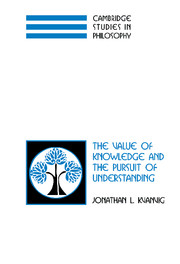Book contents
- Frontmatter
- Contents
- Introduction
- 1 The Value of Knowledge Is External to It
- 2 The Value of True Belief
- 3 The Value of Justification
- 4 Reliabilism, Normativity, and the Special Promise of Virtue Epistemology
- 5 The Gettier Problem and the Value of Knowledge
- 6 Knowledge as Irreducibly Valuable
- 7 Epistemic Attitudinalism: Semantic and Pragmatic Approaches
- 8 Knowledge and Understanding
- 9 Conclusion
- References
- Index
Introduction
Published online by Cambridge University Press: 14 August 2009
- Frontmatter
- Contents
- Introduction
- 1 The Value of Knowledge Is External to It
- 2 The Value of True Belief
- 3 The Value of Justification
- 4 Reliabilism, Normativity, and the Special Promise of Virtue Epistemology
- 5 The Gettier Problem and the Value of Knowledge
- 6 Knowledge as Irreducibly Valuable
- 7 Epistemic Attitudinalism: Semantic and Pragmatic Approaches
- 8 Knowledge and Understanding
- 9 Conclusion
- References
- Index
Summary
The history of epistemology centers on the concept of knowledge, especially on the difficult questions of whether knowledge is possible and, if it is, how much of it there is. A presupposition of this inquiry is that whether and to what extent we have knowledge is deeply important. Philosophers reflect on the nature and extent of knowledge not simply because they have free afternoons to fill but (also) because questions about what we know and how we know it touch on the deeply significant questions about the relationship between mind and world and the possibility of success in determining what is true and what is not. In a word, knowledge is valuable, and philosophers reflect on what we know because they share this viewpoint.
Given the centrality of this presupposition to epistemological inquiry, it is surprising to find so little discussion of the value of knowledge in the history of epistemology. Given the singular importance of the concept of knowledge to the history of philosophizing about the nature of cognitive success, we might have expected such inquiry to be preceded by a defense of the idea that knowledge constitutes an (almost) unsurpassable achievement with respect to the connection between mind and world. Such expectation disappoints, however. The question of the value of knowledge is simply not among the questions that dominate the history of epistemology.
- Type
- Chapter
- Information
- The Value of Knowledge and the Pursuit of Understanding , pp. ix - xviPublisher: Cambridge University PressPrint publication year: 2003



